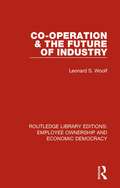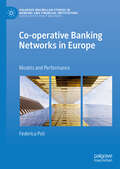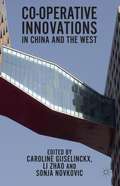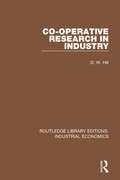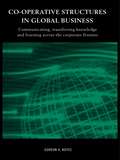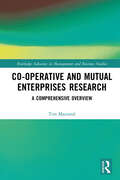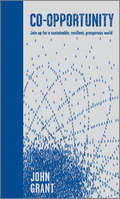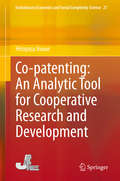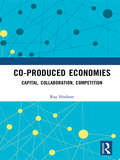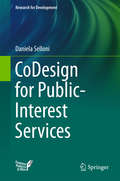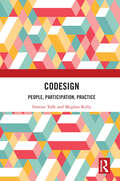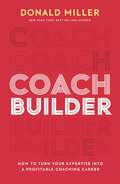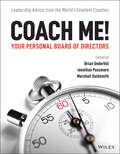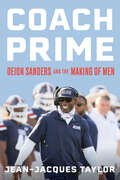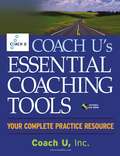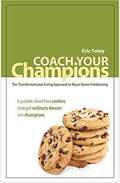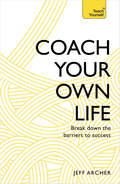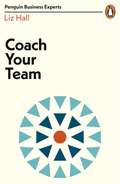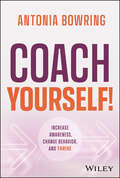- Table View
- List View
Co-operation and the Future of Industry (Routledge Library Editions: Employee Ownership and Economic Democracy #16)
by Leonard S. WoolfIn this book, originally published in 1918, the Leonard S. Woolf explores the development of the Co-operative Movement into a democratic industrial system. This title combines a description of the movement as it was, with a picture of the ways in which the author felt it would become if it followed out and developed its principles and ideals. This title will be of interest to students of economic history and employee ownership.
Co-operative Bank
by Srikant M. Datar Robert S. KaplanA British bank with strong roots in the cooperative movement encounters declining profitability in an increasingly competitive and deregulated financial services industry. It attempts to grow by broadening its customer base and increasing the range of products and services offered. It turns to activity-based costing as part of its reengineering effort to learn more about the process and product costs and customer profitability, and contemplates what actions to take based on this new information.
Co-operative Banking Networks in Europe: Models and Performance (Palgrave Macmillan Studies in Banking and Financial Institutions)
by Federica PoliOver the past 20 years, the increased dominance in banking of the shareholder ownership model, whose main purpose is to maximize financial returns for shareholders, has proved to be a toxic combination with the financial deregulation the sector has undergone, the creation of new financial instruments and the concomitant rising levels of debt. Despite the growing role of private limited-liability banks around the world, co-operative banking still offers a compelling alternative, especially in Europe where the roots of co-operative institutions date back to the nineteenth century. This book studies the characteristics of different co-operative banking models of networks across several European countries to assess their impact on the profitability and resilience of the networks and their co-operative components. To date, empirical studies have neglected to examine the features of the networks to which co-operative banks belong. Surprisingly, there is little evidence on the extent to which the diverse organizational network structures determine differences in the profits and stability of individual banks and their networks across different countries. The principal objective of this book is to fill this gap in the literature. The European countries considered are Austria, Finland, France, Germany, Italy and the Netherlands. In these countries, co-operative banks constitute a significant presence although the organizational forms their networks take are quite different. Focusing on this sample of European countries therefore affords insights and reveals policy implications about the role that network organizations play in driving the performances of co-operative banks, which will be of interest to academics, researchers, and students of banking and financial institutions.
Co-operative Industry (Routledge Revivals)
by Ernest AvesErnest Aves (1857-1917) was an influential social analyst and civil servant. This title, first published in 1907, during Aves’ work for the Board of Trade, investigates the different forms of industrial co-operation within Britain; the fundamental principle of this is stated as "equitable association", leading to increased profitability and the strengthening of industry. Chapters discuss such areas as centralisation, co-operative production and co-operative agriculture. This interesting reissue will be of particular value to students of economics with an interest in co-operative industry and the history of economic thought.
Co-operative Innovations In China And The West
by Caroline Gijselinckx Li Zhao Sonja NovkovicThis book aims to contribute to our understanding of recent changes in Chinese and Western cooperatives. It will provide a variety of audiences with relevant and useful information for further co-operative development, mutual understanding and cooperation.
Co-operative Research in Industry (Routledge Library Editions: Industrial Economics #4)
by D.W. HillThis book, first published in 1947, sets out to describe what co-operative research is, how it is organised and in what way it contributes to a variety of problems around the globe. The need for scientific research can often be beyond a single company; co-operative research can provide the people, materials and money on a scale that is otherwise lacking. The book looks at the scope of co-operative research internationally, with chapters focusing on the UK and US, as well as the rest of the world.
Co-operative Structures in Global Business: Communicating, Transferring Knowledge and Learning across the Corporate Frontier (Routledge International Studies in Business History #No.9)
by Gordon H. BoyceUsing a series of twelve historical case-studies that are based on extensive archival research, this book explains why firms succeed or fail in communicating or transferring knowledge and discovering new expertise. By analysing how workable trade-offs between opposing forces have been achieved in the past, this study provides a set of guidelines for executives who embark upon inter-firm projects.
Co-operative and Mutual Enterprises Research: A Comprehensive Overview (Routledge Advances in Management and Business Studies)
by Tim MazzarolCo-operative and mutual enterprise is one of the oldest and most enduring forms of business, encompassing co-operatives, mutual firms, friendly societies, and credit unions. This book provides an expert overview of contemporary research in this important field. Governments around the world have encouraged the development of co-operative and mutual enterprises (CMEs), yet relatively little attention has been given to them within the mainstream business and economics research literature. In this book, the author summarises the origins, impacts, and structure of the research field. The book does so by focusing on the CME business model and is structured around a conceptual framework for research into CMEs. It also explores the historical evolution of the CME research field and presents a systematic review of the literature. Foundation theories relevant to CMEs are discussed before detailed discussions of the research from a systems, enterprise, and member level perspective. This book critically analyses the state of knowledge in the field of CMEs which delivers a concise and valuable book for scholars and students in the fields of business and management around the world.
Co-opportunity
by John GrantJohn Grant is back! Bestselling author of Green Marketing Manifesto fame returns to get you involved in creating a sustainable future!In this book, green business guru John Grant shows how we, when we join forces through co-operative initiatives, can really make changes and work towards a better future.John uses cases and examples from around the world, from social networks to social ventures, Carrot Mobbing to the Carbon Disclosure Project, to show how a move to greater co-operation via what he calls Co-operative Networks can be a way forwards for all of us to increase the common well-being. Arguing that a climate for change can be created by engaging rather than alienating people, John also demonstrates ways of 'relocating dreams' to allow us to reassess our desires and priorities.Whether you are a business leader, politician, armchair economist, environmentalist or general interest reader, the inspiration and ideas John Grant provides in Co-Opportunity encourages us all to think again about our individual behaviour and our actions - our ideas of what it is to be human - and to get co-creating to build a better world for all. Sit back and watch, or become part of this grass roots new movement.
Co-patenting: A Network Science Approach (Evolutionary Economics and Social Complexity Science #21)
by Hiroyasu InoueThis is the first book that comprehensively analyses co-patenting in Japan and the U.S., which directly signifies collaborations between firms and inventors, using the methodology of network science. Network science approaches enable us to analyse the structures of co-patenting networks. In addition, generative models in network science estimate the probability of new connections between nodes, which enables us to discuss the temporal development of networks. On the other hand, regression analyses, which are broadly used in the field of economics, may be effective for determining what attributes are important for firms and inventors that are going to be connected, but such techniques cannot consider the complexity of networks. This book compiles a series of studies by the author on geographical location and co-patenting using data that were published in eight academic journal articles. This book gives the reader ideas about how we can utilize patent data to understand how firms and inventors collaborate under the effect of complex networks.
Co-produced Economies: Capital, Collaboration, Competition
by Ray HudsonIn common with most other advanced capitalist economies of the Global North, the UK has experienced a decline in the manufacturing industry and an increase in the service sector in recent decades. At the same time, there has been a substantial manufacturing growth in a number of countries in the Global South, especially China and India. Why have these changes occurred? What have been their economic and ecological consequences? How can we best understand the way the contemporary economy functions? This book explores the answers to these questions, proposing that the contemporary capitalist economy is best understood as a complex socio-spatial system of co-production involving relations between people, things and non-human entities. It is argued that these people typically have conflicting and competitive interests yet can come together to resolve their differences or find ways of regulating their conflicting interests. National states continue to have a critical role in establishing these systems of regulation. At the same time, many companies draw on the knowledge of their customers while others enrol animals, insects and plants as co-producers. As a result, the improbable processes of commodity production and capital accumulation continue more or less routinely; with problems and occasional crises overcome in a variety of ways. Co-produced Economies will be of interest to students of economic geography, political economy and economic development, and more generally to social scientists interested in issues of the causes and consequences of economic change. It will also be of relevance to policy makers seeking to develop economic policies in the increasingly volatile global economy and in the context of growing environmental concerns.
Co-production and Japanese Healthcare: Work Environment, Governance, Service Quality and Social Values (Routledge Studies in Health Management)
by Victor A. PestoffHealthcare in most developed countries face a complex and partly contradictory mix of financial, social and political challenges. Fiscal strains combined with New Public Management agendas have caused severe cutbacks and calls for greater efficiency in public healthcare, resulting in a growing concern about service quality. Co-production and Japanese Healthcare explores a possibility to address these issues from a new perspective that emphasizes greater collaboration between the staff and patients. Here professionals and patients/clients act as ‘partners to co-produce healthcare through their mutual contributions’. Japan has a unique system of two user-owned healthcare providers with nearly 200 hospitals, 500 clinics and 50,000 beds. However, they differ from each other and from public hospitals, in terms of their work environment, service quality, governance models and social values. This volume compares cooperative and public healthcare providers at ten hospitals across Japan with survey data from the staff, as well as from the patients and volunteers at four hospitals. It will be of interest to researchers, academics, and students in the fields of healthcare management, public and non-profit management, human resource management.
CoDesign for Public-Interest Services (Research for Development)
by Daniela SelloniThis books focuses on co-design, and more specifically, on the various forms co-design might take to tackle the most pressing societal challenges, introducing public-interest services as the main application field. To do so, it presents an extensive study conducted within a particular community of residents in Milan: this is a social innovation story integrated into the discipline of service design, which simultaneously deepens the related concepts of co-design, co-production and co-management of services. Drawing upon this experience and further studies, the book presents the idea of a collaborative infrastructure and its related infrastructuring process in ten steps, in order to explore the issues of incubation and replication of services and to extensively investigate the creation of those experimental spaces in which citizen participation is fostered and innovation in the public realm is pursued. Lastly, the book develops other lines of reflection on co-design seen, for example, as a form of cultural activism, as an instrument for building citizenship, and as a key competence for the public administration and thus as a public service itself. The idea of co-design as a way to regenerate the practices of democracy is a recurring theme throughout the book: co-design is a process that seeks to change the state of things and it is intentionally presented as a long and complex path in which the role of designer is not only that of a facilitator, but also that of a cultural operator who contributes with ideas and visions, hopefully fostering a real cultural change.
CoDesign: People, Participation, Practice
by Meghan Kelly Simone TaffeCoDesign: People, Participation, Practice explores the past, present, trends, and future potential of codesign and participatory practices globally. Rooted in participatory design traditions, the book emphasizes the importance of inclusivity in the creation of systems, products, services, and technologies, offering a fresh perspective on codesign’s dynamic, multifaceted nature. Drawing on interviews with leading scholars and real-world case studies, it examines how collaboration among designers, academics, students, and industry partners leads to successful outcomes.The book identifies three core themes – People, Participation, and Practice – each unpacked into subthemes. People focusses on engaging and facilitating stakeholders; Participation explores power dynamics and politics; and Practice addresses how infrastructure constraints – such as time, budget, and context – shape the codesign process. The codesign process is organized into eight phases – funding, arranging, preparing, workshopping, translating, testing, executing, and evaluating – providing a structured framework for understanding how projects unfold. The themes under the core elements – People, Participation, and Practices – serve as adjustable ‘levers’ to address project challenges and guide change. These levers encourage reflection on roles, power dynamics, and decision-making to ensure alignment with goals. CoDesign: People, Participation, Practice concludes with a CoDesign Terminology Toolkit, clarifying essential terms to improve communication and foster understanding across the field.This comprehensive resource serves as a valuable guide for practitioners, students, and researchers, supporting the ongoing development of codesign in an ever-evolving world.
Coach Builder: How to Turn Your Expertise Into a Profitable Coaching Career
by Donald MillerWhether you&’re thinking about starting a consulting business or have been coaching for a while, Coach Builder will give you the 8-step plan every self-employed coach needs to be successful.Have you experienced a moment when you realized your career wasn&’t as secure or fulfilling as you thought it was going to be?Maybe you&’ve thought about using your skills to start your own consulting business – but you haven&’t had the confidence to go for it.Donald Miller has been consulting and coaching for over two decades. He&’s consulted some of the world&’s top brands including TOMS Shoes, TREK Bicycles and Tempur Sealy.In 2020, he founded his own coaching program, where he&’s helped hundreds of coaches start and grow their business. As a coach of coaches, he knows exactly what it takes to build a successful consulting career – and now he&’s sharing eight secrets of success with you.In Coach Builder you&’ll learn how to…Create a menu of services to sell to clientsGenerate and manage a list of potential clientsCreate a compelling website that attracts your ideal clientsWrite and automate sales emails that land clients while you sleepCreate a marketing funnel and product ladderSet realistic business goals and accomplish themBuild or join a community to help you growNavigate the nuances of the client/coach relationship If you&’re ready to make a lot of money doing something you love every single day, Coach Builder is the book you&’ve been waiting for.
Coach K: A Matter of the Heart
by Leslie A. Perlow Scott A. Snook Brian J. DelaceySuccessful college basketball coach Mike Krzyzewski faces the decision whether to accept a lucrative offer to coach a professional basketball team or continue to coach at Duke University. Provides a context for discussing various styles of power, influence, and persuasion in the context of his coaching career.
Coach Knight: The Will to Win
by Leslie A. Perlow Scott A. Snook Brian J. DelaceySuccessful college basketball coach Bob Knight was fired from his long-time role as basketball coach at Indiana University and hired in the same role at Texas Tech. Considers these events in the context of his long career and provides a context for discussing various styles of power, influence, and persuasion in his leadership role as coach and educator.
Coach Me! Your Personal Board of Directors: Leadership Advice from the World's Greatest Coaches
by Marshall Goldsmith Jonathan Passmore Brian UnderhillCOACH ME! YOUR PERSONAL BOARD OF DIRECTORS An indispensable wellspring of advice from the world’s foremost leadership experts In Coach Me! Your Personal Board of Directors: Leadership Advice from the World’s Greatest Coaches, a team of world-renowned executive coaches and leadership experts delivers a revolutionary collection of contributions from 52 of the globe’s leading management thinkers. Each curated piece explores a critical issue in leadership, covering topics like self-awareness, communication, interpersonal relationships, emotional intelligence, delegation, coaching, change management, transition management, execution, and career development. Among the 50 stories included within, readers will find inspirational and practical advice based on real-world leaders who were forced to transform their company’s business model, their organization, or themselves to achieve success. Each concise, actionable chapter lets you be a fly on the wall of a successful leader demonstrating a solution to a commonly encountered leadership problem. Coach Me! Your Personal Board of Directors also provides: Thorough introductions to self-examination and self-awareness, including maximizing the impact of feedback and proven techniques to ensure your leadership measures up Comprehensive explorations of communication and interpersonal relationship skills, including treatments of authenticity and cultural fluency Practical discussions of emotional intelligence, including the management of out-of-control feelings and conflict management In-depth examinations of change and transition management, including explorations of the first 100 days as a new leader and how to lead teams through crises Perfect for managers, executives, and business leaders of all kinds, Coach Me! Your Personal Board of Directors: Leadership Advice from the World’s Greatest Coaches will also earn a place in the libraries of the coaches, consultants, and other professionals who work with leaders in government, business, and the nonprofit sectors.
Coach Prime: Deion Sanders and the Making of Men
by Jean-Jacques TaylorAn exclusive insider account with unprecedented access to Deion Sanders, his staff, and players, who are changing the culture of college football."A highly readable portrait of one of the most exciting coaches in college football." – San Deigo Union-Tribune"You won't find a more competitive person than Coach Prime. At Jackson State, he wanted to dominate and win.... Nothing has changed but the address. He wants to dominate and win a national championship at Colorado." (from Coach Prime)Known for decades as one of the NFL’s most iconic and spectacular playmakers, Deion Sanders remains college football's most intriguing newsmaker. In just three years, he has become the most talked about coach by recruiting elite players to moribund programs and reviving the spirit and pride of forgotten fanbases by winning. Along the way, he’s changing how we think about college sports while rejuvenating whole communities with the national attention that follows him and the fresh commerce a winning culture ignites.First at Jackson State and now at Colorado, Sanders has displayed a knack for leading miraculous turnarounds of once-storied-but-long-irrelevant programs. Television cameras turn up for national broadcasts, gameday attendance skyrockets, economic impact reaches the tens of millions, and NFL scouts take renewed interest.Meanwhile, off the field, Sanders displays an uncanny ability to connect with his players. Weekly chat sessions about life and love are the norm. His unyielding commitment to guiding his players to become exceptional men raises the bar on what parents and athletes expect from college coaches.Now, with access no other reporter has been granted, veteran sports journalist Jean-Jacques Taylor takes readers inside one season with Deion Sanders to show the heart, mind, and culture of America's most innovative football coach and his team of would-be champions.
Coach U's Essential Coaching Tools: Your Complete Practice Resource
by Coach U Inc. StaffHundreds of client-centered assessments, forms, and checklists as well as the essential marketing aids that every coach needs to build a successful practice Founded in 1988, Coach U, Inc. , is the largest provider of online training for individuals interested in entering the fields of personal and professional coaching. Coach U, Inc. , has educated more than ten thousand people, providing them the information, tools, and knowledge they need to successfully enter the fast-growing world of life, career, business, and corporate coaching. Coach U, Inc. 's unique approach to training encompasses the entire development of the professional coach. From the beginnings of becoming a coach, to all the ins-and-outs of growing a successful coaching practice, this program provides a comprehensive, step-by-step approach to learning how to become a strong, ethical, and dynamic leader in the coaching field. An all-in-one guide, Coach U's Essential Coaching Tools includes all of the materials a personal or executive coach needs to start and grow a successful coaching practice. This handy book and CD package includes both self- and client-assessment tools and worksheets/exercises to aid you in working effectively with your clients, as well as proven marketing and business development materials to help you get more clients and run a profitable coaching practice or provide superior coaching within an organization. Among these useful tools, you'll find: New client checklists, discussion and principles lists, success formulas, coaching mistakes to avoid, and many other helpful tools for coaching Record keeping and documentation forms to use in tracking your clients' personal information and billing information Worksheets, checklists, and sample materials to help market your practice A CD-ROM that contains all the materials in the book-fully customizable for your unique needs
Coach Your Champions: The Transformational Giving Approach to Major Donor Fundraising
by Eric Foley Rebekah Farquhar Amy Karjala Greg StierIs your Christian nonprofit or church struggling financially? Do you find yourself saying, "If only we could find a few more givers with deep pockets to help us make budget?" It's an understandable sentiment. But the Bible holds a totally different approach to major donor development - one completely counter to the secular fundraising approach ministries have been taught they must practice. <p><p> In this nuts and bolts nonprofit fable, you'll learn how: -God has already sent your organization all the major donors you need. -Major donors are about more than big gifts; they're champions awaiting your coaching to make a comprehensive difference in your cause. -Each and every person who comes to your ministry is sent as a gift and challenge from God - and God is holding you accountable to grow each one to their fullest potential. As you set aside the secular shackles you've unwittingly placed on your Christian development program, you'll lower the barriers to meaningful involvement in your cause while raising the bar for what you can expect from your ministry's champions - all while having a lot more fun in fundraising.
Coach Your Own Life: Break Down the Barriers to Success
by Jeff ArcherAre you looking to improve your professional and personal performance? Do your goals and ambitions need an overhaul - or a complete rethink? This updated new edition of a dynamic and motivating guide will give you the resources and toolkit to coach yourself to an improved and enhanced performance in all areas of your life. Covering everything from career development to personal relationships, appearance and money management, it offers a program of change and progress for each area, while encouraging you to examine your own beliefs, confidence and motivation to ensure that change is for the better and for the long-term. It uses practical resources such as diaries and checklists along with review programs, reward structures and case studies in success. This new edition also contains plenty of tools and advice to help you overcome blockages and obstacles, develop resilience, and become more mindful.
Coach Your Team (Penguin Business Experts Series)
by Liz HallIt has never been a more challenging time for managers and leaders to maintain a happy, healthy workforce. The pace of change and increasing uncertainty in most industries has resulted in a rapid increase in stress and anxiety in the workplace, and most organizations are poorly equipped to respond to these challenges in a meaningful and supportive way.Penguin Business Experts: Coach Your Team is a practical guide for leaders who want to foster a culture where everyone has a chance to flourish, create and innovate while being happy and more resilient. It draws on cutting-edge evidence-based techniques in coaching that focus on developing mindfulness and compassion in leaders, their employees and throughout their organisation with case studies of best practice from around the world. It covers everything you need to know to develop your own approach to coaching starting with learning how to coach yourself through to techniques to foster a coaching culture rooted in mindfulness and compassion within your team, and ultimately your organisation.
Coach Yourself!: Increase Awareness, Change Behavior, and Thrive
by Antonia BowringBecome the best version of yourself using these practical frameworks exploring the power of performance coaching from a Top NYC Executive Coach. Coach Yourself! is a guide for people who are committed to increasing their awareness about behaviors that aren’t serving them at work or in the rest of their lives, and then taking the necessary actions to move forward. If you’re ready to explore changing habits and behaviors to improve how you show up in work and life, this book is for you. With practical and accessible frameworks exploring the power of performance coaching, Top NYC Executive Coach Antonia Bowring teaches readers to use her performance coaching formula: increased awareness + changed behavior = flourishing individual and thriving work performance. Bowring offers recipes, frameworks, and tools you can use to navigate the exhilarating, and inevitably bumpy, journey through your professional life. You’ll discover: Foundational definitions and concepts, including discussions about the different kinds of coaching, the benefits they bring to the table, and the processes they use The importance of your values, and how they anchor your progress through your coaching journey Communication strategies used by the world’s most effective problem-solvers and decision-makers in the world While this will be an essential guide for professionals and leaders, anyone can pick up this book and apply the frameworks to various aspects of their life. The essence of coaching is that we have the answers inside ourselves, and the role of the coach is to help us access our own answers.
